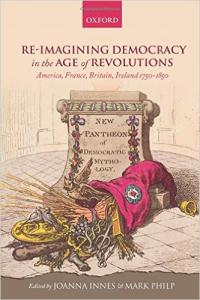Professor Joanna Innes
I grew up in Britain and the US. I studied at Cambridge, and have taught at Oxford since 1982. I am interested in government, society and ideas, in Britain, Europe and the larger European world, between the later seventeenth and mid nineteenth centuries.
More specifically, my research and writing has two main strands. One concerns developments in British, especially English social policy during the eighteenth and early nineteenth centuries. In addition, for more than ten years now I have been running an international collaborative project about changing attitudes to and practices associated with democracy in Europe and both Americas in the same period.
I see the academic study of history as a collaborative exercise, and have been involved in collaborative projects throughout my career.
Between 1990 and 2000 I was co-editor of Past and Present, and remain a member of this and several other journal editorial boards. I have spent several periods teaching or researching abroad: in Australia, Germany, Japan and France.
Inferior Politics: Social Problems and Social Policies in Eighteenth-Century Britain (OUP Oxford,October 2009).

Inferior Politics explores how social policy was created in Britain in a period when central government was not active in making it. Parliament proved capable of generating national legislation nonetheless-and provided a forum for debate even when it was impossible to mobilise consensus behind any particular plan. In this setting, there was a lively, and surprisingly inclusive, 'politics' of social policy-making, in which 'inferior' officers of government (what we might call 'local authorities') figured prominently.
The book explores institutional structures which shaped these debates and their outcomes, and supplies several case studies of policy-making: one focussing on some of the less well-known activities of William Wilberforce, as he attempted to promote a national 'reformation of manners'; others featuring such apparently marginal figures as imprisoned debtors and a lowly (and bigoted) London constable. A central chapter explores the history of social and economic empirical enquiry from the invention of 'political arithmetic' in the later seventeenth century through to the first census of 1801, detailing similar interaction between government and private enthusiasts.
Drawing together three decades of the author's work, including two new essays, Inferior Politics demonstrates how Joanna Innes has significantly revised and extended our understanding of the ways and means of British domestic government, in an era marked by institutional continuity but continuing and vigorously debated social challenges.
Re-imagining Democracy in the Age of Revolutions: America, France, Britain, Ireland 1750-1850 (Oxford University Press, May 2015).

Re-imagining Democracy in the Age of Revolutions charts a transformation in the way people thought about democracy in the North Atlantic region in the years between the American Revolution and the revolutions of 1848. In the mid-eighteenth century, 'democracy' was a word known only to the literate. It was associated primarily with the ancient world and had negative connotations: democracies were conceived to be unstable, warlike, and prone to mutate into despotisms. By the mid-nineteenth century, however, the word had passed into general use, although it was still not necessarily an approving term. In fact, there was much debate about whether democracy could achieve robust institutional form in advanced societies.
In this volume, a cast of internationally-renowned contributors shows how common trends developed throughout the United States, France, Britain, and Ireland, particularly focussing on the era of the American, French, and subsequent European revolutions. Re-imagining Democracy in the Age of Revolutionsargues that 'modern democracy' was not invented in one place and then diffused elsewhere, but instead was the subject of parallel re-imaginings, as ancient ideas and examples were selectively invoked and reworked for modern use. The contributions significantly enhance our understanding of the diversity and complexity of our democratic inheritance.
- British especially English social policy in the eighteenth and nineteenth centuries
- State, society and culture in Britain 1688-1850
- Changing ideas about and practices of democracy in Europe and both Americas from mid C18 to mid C19
My current research follows two main strands. I have worked for several decades on the making of social policy in eighteenth and early nineteenth-century Britain and Ireland, and in that context have moved between exploring the history of the state, social history and the history of ideas. Some of my key essays on this theme are collected in Inferior Politics. Social Problems and Social Policy in Eighteenth-Century Britain (2009). I am also putting together a collection of my essays on poverty and poor relief, including some previously unpublished work. My new research focusses especially on changes in the British social policy agenda and policy-making processes c1780-1830, among other things on the beginnings of parliamentary engagement with health, education and working conditions; the renewal of parliamentary and governmental interest in the pastoral functions of the established church; changes in the ‘public sphere’ and their implications for policy making, and in the way Parliament related to the various parts of the British Isles. Many of my recent articles explore this new terrain.
I have also been involved for more than a decade in coordinating an international network exploring the 'reimagining' of democracy between the mid eighteenth and mid nineteenth centuries, across Europe and both Americas. An edited book emerging from this project, Re-imagining Democracy in the Age of Revolutions: France, America, Britain, Ireland 1750-1850 was published in 2013. During 2012-15 I held a Leverhulme International Network grant which allowed me and my co-organiser, Mark Philp to extend this enquiry to the Mediterranean region: we are now working on another collection of essays arising from that phase of the project, and also opening a new phase of enquiry on Latin America and the Caribbean, in collaboration with Professor Eduardo Posada-Carbo of Oxford’s Latin American Centre.
I am also interested in how historians conceptualise their subject matter. I have published on the concept of the public sphere (in Japanese only); on ‘networks’, and on the history of emotions (in the introduction to a forthcoming collection, Suffering and Happiness in England 1550-1850, eds. Michael J. Braddick and Joanna Innes. I recently organized an interdisciplinary workshop on the history of words and concepts.
Current DPhil Students
- Myungsu Kang
I would be willing to hear from potential DPhil students regarding:
British History 1700-1850;
Topics associated with the history of democracy c1750-1850
I currently teach:
|
Prelims |
FHS |
|
British History V |
British History V |
|
General History IV |
General History X |
|
Theories of the State |
General History XI |
|
Haiti and Louisiana |
FS: Metropolitan Crucible, London 1688-1815 |
| SS: Debating social change: Britain and Ireland 1775-1825 |




